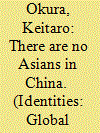| Srl | Item |
| 1 |
ID:
177969


|
|
|
|
|
| Summary/Abstract |
Foreigners who arrive in the United States experience a process of racialization by which they adjust to the new racial realities of their host society. This paper presents a unique longitudinal study of racialization, drawing upon 30 interviews with 15 Chinese international students conducted twice per respondent over six months. The first interviews were carried out within two weeks of the students’ arrival in the U.S. to capture their pre-migration racial schemas and racial identity. Upon their arrival in the U.S., Chinese students primarily understand the concept of ‘race’ through the paradigm of nationality and racially identified as Chinese. Just half a year later, however, there was a striking shift towards a conceptualisation of race that emphasises phenotype over nationality, and some respondents began to identify with the pan-national racial label ‘Asian.’ I argue that these changes can be attributed to the process of racialization in the United States.
|
|
|
|
|
|
|
|
|
|
|
|
|
|
|
|
| 2 |
ID:
160959


|
|
|
|
|
| Summary/Abstract |
How do we teach and learn the human experience of war? How far removed is this experience from a classroom? This article uses these questions as the starting point for an investigation into the presence/absence of war experience, the effects of narratives distancing war, and the consequences of challenging these narratives. It draws on the experience of an undergraduate module at the University of Kent that investigates the human experience of war in which students were asked to reflect on the question of distance between those living “war experiences” and their lives in a small British city. Unexpectedly in 2015, several students argued that this distance was the lecturer's construction. By making war personal—without any of them having experienced a “war zone”—the students chose to argue that war was also their experience. This response directly challenges an established narrative in international relations that the West has been essentially at peace since World War II, a narrative that obscures the fundamental role of war experience in the lives of ordinary citizens. It leads to a broadened understanding of war experience that has important conceptual, political, and normative implications in the study of war and on our political responsibility in the everyday.
|
|
|
|
|
|
|
|
|
|
|
|
|
|
|
|